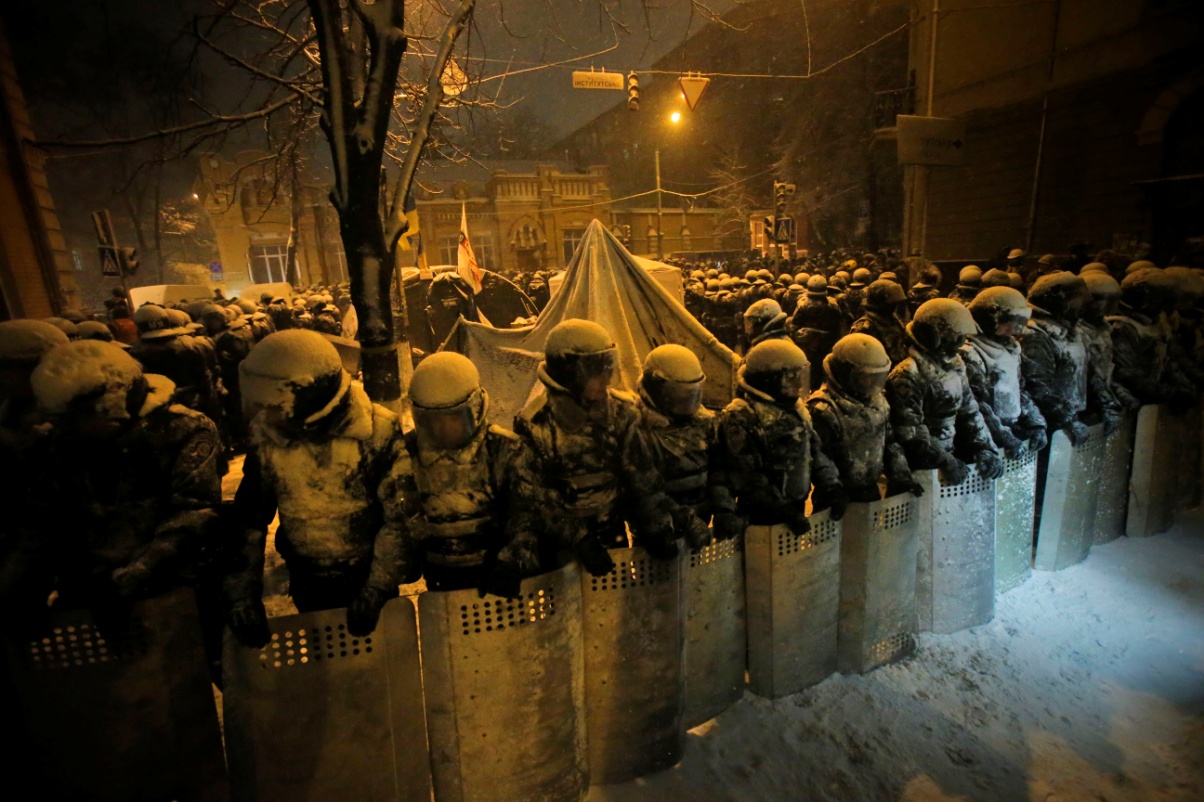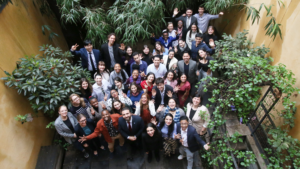In just 93 days, what started as peaceful student demonstrations became a violent revolution. The documentary Winter on Fire brings you the story of Ukraine’s fight for freedom from the frontlines of the 2014 uprising.
What happened?
Winter on Fire provides an interesting in-depth look at the Ukrainian uprising in Kiev’s Maidan Square for 93 days in late 2013 and early 2014. The revolt against corrupted Ukrainian president Viktor Yanukovych started as a peaceful civil demonstration supporting an association agreement with the European Union, ultimately turning into a violent revolution. How did it happen?
In early 2013, Ukrainian President Viktor Yanukovych announced his intention to sign an economic agreement with the EU that would strengthen and further Ukraine’s integration, stressing its independence from Russia at the same time. Nevertheless, by November 2013, he radically changed his mind suspending preparations to sign the agreement. Instead, he approved a treaty and a multibillion-dollar loan with Russia. Many of the pro-European Ukrainians felt betrayed by their government and most importantly by the head of the State. As a result about 2,000 Euro-inclined Ukrainians gather on Maidan Square to protest, alerted by Facebook posts. While claiming “Ukraine is part of Europe” and “We need European education, we want to break the wall”, their numbers kept on growing day by day, all asking the same thing: Yanukovych’s to change the course or to resign.
Flooding the streets with a series of peaceful demonstrations, the protestors were severely repressed by the government’s extreme police force, Berkut, that actually provoked the use of force. Demands and basic freedoms of thousands of Ukrainians were roughly suppressed.
The movie shows the variety of people who got entangle in this conflict, including students, professionals and even clergy. Literally, Ukrainians from all around the country gather in sincerity and dedication to their common cause. Seeing so many people risking their lives in defence of freedom, cannot be more meaningful and inspiring.
Eventually, 125 people died, further hundreds got injured to expel Yanukovych from the country. The Maidan uprising didn’t come to an end with a peaceful reunification of the country, but led to a civil war and drastic Russian interventions.
Norman Davis, The solidarity decade
Watching Winter on Fire reminds us of The Solidarity Decade wrote by Norman Davis that has been included in the Chapter 6 of WYA’s Track A training. The text speaks about the Solidarity Movement in Poland which emerged in the early 1980s as a response to the communist regime and its apparent repressions on Polish society and violation of civil rights. What seems to be important, Poles fought the communist regime, not with weapons, but through democracy, political negotiations and peaceful demonstrations, thus challenging the foundations of the political system, based on coercion, central planning and limitation of basic freedoms.
People involved in the movement were not afraid of being arrested in the name of their cause and the common good they were defending. The essential example is Lech Walesa, the most recognizable face of the opposition. With the progressive weakening of communism worldwide, the Solidarity Movement gained more power and eventually the regime fell. Consequently, Walesa was elected president, in a relatively peaceful transition.
What is striking in this historical event is how working for the common good with peace and respect for fundamental rights led to a victory over communism. This movement reunited millions of people who wanted to erase the Soviet regime from Poland.
Solidarity Movement in Poland also benefited from a great deal of support from Catholic Church with Pope John Paul II at the forefront. His visit to Poland and meaningful speeches gave hope and motivation to millions of Poles. In fact, without both, the efforts of Solidarity Movement and support of Pope John Paul II tremendous changes in Poland would not be possible.
According to WYA member from Burma, what appeals in the Polish experience the most, is “their ability to put their country’s good before their own personal comfort and their ability to unite as one before a power that only looked to divide and control them”. And here comes in the same line Winter on Fire which captures the remarkable mobilization of Ukrainian citizens from across the country protesting the corrupted political regime that clearly turned against its own people and shown disregard for human dignity. Watching Ukrainians unified for the same purpose and determined to defend their basic freedoms regardless of the violent and deadly tactics used by the authority is both, inspiring and powerful.
The Ukrainian revolution, just like the Solidarity Movement in Poland captures the story of the tremendous spirit of human resilience, the spirit of common good that is put before personal comfort. It makes us convinced, once revealed truth about human dignity will not be forgotten, but preserved by the nation.
Our experience in France
In France we were not really aware that such things were happening in Europe. Indeed, Winter on Fire is a useful documentary, which has allowed us better understand Ukrainian uprising.
It reminds us of demonstrations organized by the ‘Manif pour tous’ against gay marriage happening in Paris and all around France in 2013 to 2014 (basically at the same time as the Ukrainian revolution). Many times there were more than a million people in the streets defending their convictions and their vision of the family as basic unit of society. We were part of those peaceful demonstrators protesting against the new legislative proposal pushed by lobbies, which did not represent the majority of French people.
Numerous peaceful demonstrations took place mostly in Paris. The police repression has been very important and disproportionate. Some violent collision even emerged, created by some “hidden” policeman in the demonstrations to justify strong repression. It went until the Council of Europe which deplored the repressions by the authorities as “unjust and unusual”, including the use of tear gas against families.
It was a very strong experience for the young people and it is present in our mind until now. It woke up a whole generation that took the respect of their rights as granted. It made them realize that even a democratic government can lie, manipulate and repress its own citizens to serve its personal interests.
Eventually, the developments on a political scene in France raised conscience among young people, who decided to fight for their values and get involved in democratic life. We were also amazed by how our generation was capable to stand for its values. Just like pro-European Ukrainians, we had a clear idea of what we stand for. I believe that a real change will happen if you are strongly rooted in your convictions and have courage to speak about them loudly enough for everyone to hear.
Written by Appoline and Hortense, current WYA Europe interns from France.








